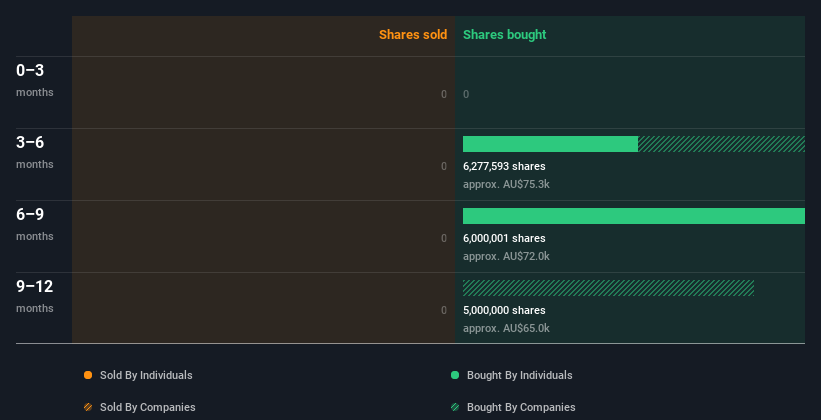A number of insiders bought First Au Limited (ASX:FAU) stock last year, which is great news for shareholders
When a single insider purchases stock, it is typically not a major deal. However, when multiple insiders purchase stock, like in First Au Limited's (ASX:FAU) instance, it's good news for shareholders.
Although we don't think shareholders should simply follow insider transactions, logic dictates you should pay some attention to whether insiders are buying or selling shares.
Check out our latest analysis for First Au
The Last 12 Months Of Insider Transactions At First Au
In the last twelve months, the biggest single purchase by an insider was when insider Malik Easah bought AU$82k worth of shares at a price of AU$0.018 per share. That means that an insider was happy to buy shares at above the current price of AU$0.013. While their view may have changed since the purchase was made, this does at least suggest they have had confidence in the company's future. To us, it's very important to consider the price insiders pay for shares. As a general rule, we feel more positive about a stock if insiders have bought shares at above current prices, because that suggests they viewed the stock as good value, even at a higher price.
First Au insiders may have bought shares in the last year, but they didn't sell any. They paid about AU$0.013 on average. This is nice to see since it implies that insiders might see value around current prices. You can see the insider transactions (by companies and individuals) over the last year depicted in the chart below. If you want to know exactly who sold, for how much, and when, simply click on the graph below!
There are plenty of other companies that have insiders buying up shares. You probably do not want to miss this free list of growing companies that insiders are buying.
Insider Ownership
For a common shareholder, it is worth checking how many shares are held by company insiders. Usually, the higher the insider ownership, the more likely it is that insiders will be incentivised to build the company for the long term. It appears that First Au insiders own 27% of the company, worth about AU$2.8m. This level of insider ownership is good but just short of being particularly stand-out. It certainly does suggest a reasonable degree of alignment.
So What Does This Data Suggest About First Au Insiders?
The fact that there have been no First Au insider transactions recently certainly doesn't bother us. However, our analysis of transactions over the last year is heartening. Insiders do have a stake in First Au and their transactions don't cause us concern. In addition to knowing about insider transactions going on, it's beneficial to identify the risks facing First Au. At Simply Wall St, we've found that First Au has 6 warning signs (4 are concerning!) that deserve your attention before going any further with your analysis.
But note: First Au may not be the best stock to buy. So take a peek at this free list of interesting companies with high ROE and low debt.
For the purposes of this article, insiders are those individuals who report their transactions to the relevant regulatory body. We currently account for open market transactions and private dispositions, but not derivative transactions.
Have feedback on this article? Concerned about the content? Get in touch with us directly. Alternatively, email editorial-team (at) simplywallst.com.
This article by Simply Wall St is general in nature. We provide commentary based on historical data and analyst forecasts only using an unbiased methodology and our articles are not intended to be financial advice. It does not constitute a recommendation to buy or sell any stock, and does not take account of your objectives, or your financial situation. We aim to bring you long-term focused analysis driven by fundamental data. Note that our analysis may not factor in the latest price-sensitive company announcements or qualitative material. Simply Wall St has no position in any stocks mentioned.

 Yahoo Finance
Yahoo Finance 
